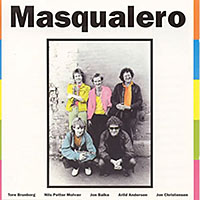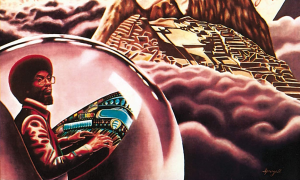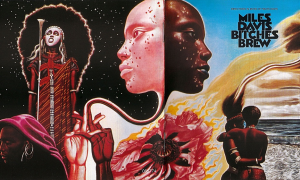Home » Jazz Articles » Rediscovery » Masqualero: Masqualero
Masqualero: Masqualero
 Masqualero
MasqualeroMasqualero
Odin
1983
Despite plenty of evidence to the contrary, there are still those who think that Norwegian musicians can't play "real jazz" (whatever that is), and that what they do play is something consistently (and erroneously) categorized as "Nordic Cool." Submitted for your approval is today's Rediscovery: the self-titled debut from Masqualero, a group that would retrospectively become known as a Norwegian supergroup and one that demonstrates there's plenty of "real jazz" going on in this country of five million, with a disproportionate number of significant artists going on to garner international acclaim. What group, after all, would name itself after a composition by American saxophonist Wayne Shorter—a composition that appears as the only non-original on Masqualero—and not be somehow affiliated with the jazz tradition?
Two of Masqualero's members—its cofounders—were already internationally known names. Double bassist Arild Andersen first appeared on Munich's lauded ECM label with Jan Garbarek on the saxophonist's early classic Afric Pepperbird (1970), moving on to record a number of albums for the label under his own name (three of them released between 1975 and '78 and collected by the label in the 2010 box set Green Into Blue-Early Quartets). Drummer Jon Christensen, after also appearing on Afric Pepperbird, went on to become the label's de facto house drummer for the next decade or so, appearing on subsequent albums by artists ranging from Garbarek, Ralph Towner and Eberhard Weber to Bobo Stenson, Miroslav Vitous and Keith Jarrett.
Both continue to record for the label to this day. Andersen's last album was the superb Mira (2014), with his longstanding trio featuring saxophonist Tommy Smith and irrepressible drummer Paolo Vinaccia; he remains a bassist who, despite possessing a muscular tone and frightening dexterity, is capable of deeper lyricism and an ability to make his instrument truly sing. Christensen—heard most recently on the overdue first-time CD issue of bassist Miroslav Vitous' Miroslav Vitous Group (1981)—is a drummer whose earlier power has been diminished somewhat by physical impairments, but who these days remains a creative player of a more textural bent. Still, 30 years on, their collaborative work in Masqualero remains some of their absolute best.
The balance of Masqualero's five members were relative youngsters.already showing substantial promise and who would subsequently go on to become well-known leaders and, in some cases, international stars. Trumpeter Nils Petter Molvaer was just 23 when Masqualero was released, and while playing here with a more burnished tone and unmistakable jazz sensibility, he would go on to become a world-famous fuser of improvisation, electronica, world music and more on albums like
Pianist Jon Balke was 28, but was on the cusp of emerging as not just an improviser with an unmistakable voice in groups like Jøkleba!, but as an even more influential composer with Oslo 13 and Magnetic North Orchestra, ensembles that had a significant impact on up-and-comers like The Source, Trygve Seim and Jaga Jazzist.
23 year-old saxophonist Tore Brunborg, in addition to superb albums as a leader including Tid (Curling Legs, 1993) and the more recent Lucid Grey (DRAVLE, 2009), would become an important collaborator with artists ranging from Ketil Bjornstad, Tord Gustavsen and Mathias Eick to Manu Katche, Misha Alperin and Mats Eilertsen.
Recorded at Oslo's Talent Studio with engineer Jan Erik Kongshaug—a pairing that, by that time, had also become a regular one for ECM label head/founder Manfred Eicher—Masqualero comes charging out of the gate with Brunborg's high octane "Ved Fossen" and rarely lets up throughout the 73-minutes of Odin's 1997 CD of the original 1983 vinyl edition, adding five bonus tracks totalling 25 minutes and, rather than placing them at the end of the record, integrates within the original set list to create a large whole with its own distinct arc.
With compositions from everyone except Christensen, Masqualero shines a powerful spotlight on players whose considerable compositional chops augment their equally admirable abilities as players. Molvær's balladic Aural Exciter," featuring an impressive solo from Andersen, could easily be seen, with its core themes, reworked into something more akin to his later electro-centric work, while Balke's percussion-driven "Not Yet" and more obliquely constructed, aptly titled "Off Balance" draws a clear line to Anti-Therapy, also released by Odin the same year, from the keyboardist's then-nascent, horn-heavy large ensemble, Oslo 13.
While Molvaer and Balke provided the lion's share of the writing, with Brunborg, in addition to "Ved Fossen," contributing another co-composition with Balke ("Fortere N") and Andersen two pieces—the dark-hued "Til Radka" and similarly crepuscular closer, "Den Hemline"—Masqualero may have been founded and led by Andersen and Christensen, but in execution it was clearly an egalitarian collective. The overall sound was inspired, in part, by the mid-'60s Miles Davis quintet of which Wayne Shorter was a member, but already spoke of influences from farther afield. Still, tracks like the absolutely incendiary, Ornette Coleman-inspired, time, no changes medley of Molvær's "Wallen, Walleni" and Balke's "Helsinki Song" made clear that this was a group that could swing...and swing hard...when the music demanded it.
Christensen and Andersen had evolved into a formidable team as early as the mid-'60s, when they accompanied American musicians coming through Scandinavia, but with Masqualero—as the two were in and around their fortieth year—they began to pay some of their experiences forward with their younger recruits. Everyone would go on to become big names on the Norwegian scene and beyond, but it all started here with Masqualero...an album that clearly so impressed Manfred Eicher that he brought the group to ECM for its three subsequent albums: 1986's Bande a Part, with the same lineup (and which shared a slightly longer version of Balke's Masqualero bonus track, "Nyl"); Aero (1988), where the departing keyboardist was replaced by guitarist Frode Alnæs; and the group's swan song, Re-Enter (1991), where, with Alnæs gone, the group chose to continue on as a chord-less quartet.
Plenty of ECM fans are aware of Masqualero's three albums for the label, but fewer know that the group came together prior to hooking up with the German label, and that as superb as its ECM releases are, Masqualero remains a record with its own charms...and rewards. A record that stands up to scrutiny three decades later as an important document of three musicians whose careers were still in relative infancy, it's another release well worth revisiting...or, if new to some, worth a first listen.
So, what are your thoughts? Do you know this record, and if so, how do you feel about it?
[Note: You can read the genesis of this Rediscovery column here .]
< Previous
Where Is Home: Janel & Anthony and Pa...
Next >
Imaginary Cities
Comments
Tags
Masqualero
Rediscovery
John Kelman
Norway
Oslo
Wayne Shorter
Arild Andersen
Jan Garbarek
Jon Christensen
Ralph Towner
Eberhard Weber
Bobo Stenson
Miroslav Vitous
Keith Jarrett
Tommy Smith
Paolo Vinaccia
Nils Petter Molvaer
Jon Balke
The Source
Trygve Seim
Jaga Jazzist
Tore Brunborg
Ketil Bjornstad
Tord Gustavsen
Mathias Eick
Manu Katche
Misha Alperin
Mats Eilertsen
Manfred Eicher
Miles Davis
Ornette Coleman
For the Love of Jazz
 All About Jazz has been a pillar of jazz since 1995, championing it as an art form and, more importantly, supporting the musicians who create it. Our enduring commitment has made "AAJ" one of the most culturally important websites of its kind, read by hundreds of thousands of fans, musicians and industry figures every month.
All About Jazz has been a pillar of jazz since 1995, championing it as an art form and, more importantly, supporting the musicians who create it. Our enduring commitment has made "AAJ" one of the most culturally important websites of its kind, read by hundreds of thousands of fans, musicians and industry figures every month.























